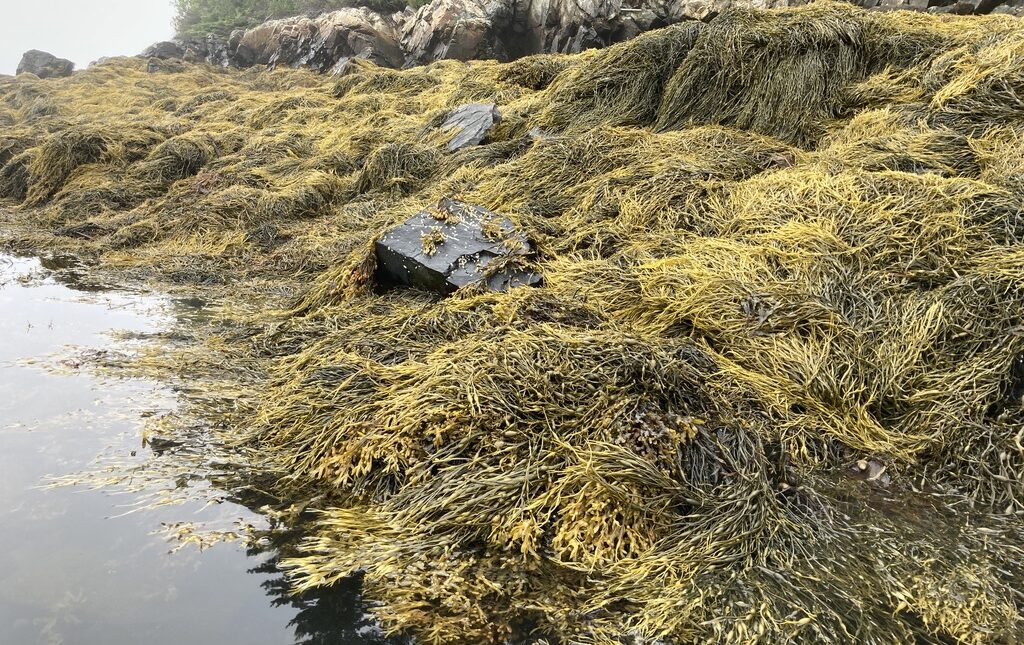In Maine, the intertidal zone is owned by the upland property owner. Public access is permitted for “fishing, fowling, and navigation.” In 2019 the Maine Supreme Court ruled that these activities do not include harvesting rockweed. A brief description of the ruling – https://law.justia.com/cases/maine/supreme-court/2019/2019-me-45.html
Arguments about whether rockweed is more similar to plants or fish have been the focus of the Court’s decision. If rockweed harvesting is considered to be a “fishery,” some argue that it should be regulated and harvested like fish. In 2018, Ben Goldfarb wrote about this legal conundrum in an article titled “A fish called rockweed” in Hakai Magazine. In 2019, Drs. Jessica Muhlin and Susan Brawley co-wrote an op-ed piece in the Bangor Daily News to emphasize that “rockweed is not a plant”. Legal interpretations of Maine state law appear to hinge on the fact that rockweed is neither fish nor fowl, and harvesting it from boats does not constitute “navigation”.
Selected news stories:
2019 Boston Globe – Clash along bucolic Maine coast erupts over rockweed.
2020 Fisherman’s Voice – One year after SJC ruling, rockweed industry still grappling with change.
2021 Quoddy Times – Lawsuit seeks ruling on beach ownership.
2023 Maine Monitor – First prosecutions against illegal rockweed harvesters.
 2018 Book by Susan Hand Shetterly, Seaweed Chronicles
2018 Book by Susan Hand Shetterly, Seaweed Chronicles
Chapter 2 – The Underwater Forest, Chapter 6 – Harvests and History,
Chapter 9 – The Uneasy Art of Making Policy,
Chapter 12 – The World According to Ascophyllum
How can people protect their shoreline property from rockweed harvesting?
Landowners’ Rights
According to the Maine Supreme Court, intertidal land is owned by the upland property owner, who has the right to protect their land from rockweed harvesting.
Property owners can notify harvesting companies that they will not allow access to their property by filling out this form and mailing it to the companies that are known to be working in the area.
Most harvesting from Searsport eastward has been carried out by Acadian Seaplants. In April 2025, the Acadian Seaplants announced that it will no longer be operating in Maine. As of summer 2025, rake-harvesting of rockweed continued in Washington County, apparently affiliated with the Look Lobster Company. Meanwhile, the status of rockweed harvesting in Hancock County is not clear.
Some property owners post signs along the shore stating “No Rockweed Harvesting.” For example, White Sign Traffic Control Products in Stillwater, ME (signs ~$30) can be contacted by calling 1-800-479-6193 to place an order on weekdays, or by sending an email to Luke@white-sign.com.
If you want to file a complaint about unauthorized rockweed harvesting on your property, you will need a copy of your deed proving that you own the property. If you see unauthorized harvesting on your property, you will need photos or videos proving that this has occurred.
To file a complaint about unauthorized harvesting, you can contact Lt Troy Dow, who is the District II (Lincolnville – Eastport) Division Head of DMR Marine Patrol. His office is in Lamoine and his cell number is 207-592-2925.
He will need information about the harvesting location, a copy of your deed, and any information you can provide about the harvester (raking or mechanized; vessel information – number, harvester; photos).
If Lt. Troy Dow is not available, call the State Police Dispatch Center in Bangor (207-947-7382). They have direct contact with the appropriate Marine Patrol Officer in your area.
What about the 2021 and 2024 lawsuits on this topic?
Several landowners were sued by rockweed industry members and their allies for contacting authorities when their rockweed was harvested without their permission, or when they advised other landowners to contact authorities after the 2019 Maine Supreme Court decided that rockweed belongs to the upland landowner. In January 2024, the Maine Superior Court ruled that these plaintiffs did not have legal standing (just cause) and their complaints are moot.
In October 2024 the Maine Supreme Judicial Court heard oral arguments about “Peter Masucci v. Judy’s Moody, LLC et al.”, in which the plaintiffs want to allow public ownership and better access to the intertidal zone. If they are successful, this could allow commercial rockweed harvesting on property that extends to the low tide line, contrary to the Court’s decision in 2019. It is not known when the Court will issue a ruling on this case.
What role does the Maine Legislature have regarding ownership of the intertidal zone?
On January 11, 2024, the Committee on Marine Resources of the 131st Legislature voted to REJECT Legislative Document 2003 (shown below). This bill would have made the intertidal zone freely available for rockweed harvesting, with very few regulations in place to protect the ecological integrity of rockweed habitats for other marine species.

To some extent, scientific publications are relevant to this proposed bill and others, as noted in a Letter to The Ellsworth American by David Porter.
